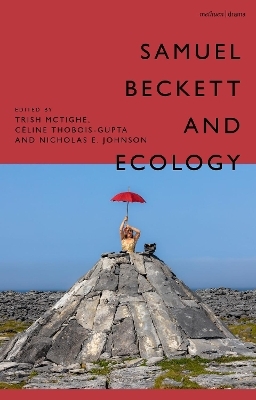
Samuel Beckett and Ecology
Methuen Drama (Verlag)
978-1-350-36602-2 (ISBN)
- Noch nicht erschienen (ca. Februar 2025)
- Versandkostenfrei innerhalb Deutschlands
- Auch auf Rechnung
- Verfügbarkeit in der Filiale vor Ort prüfen
- Artikel merken
Beckett was not an environmental artist, but his oeuvre, poised between forms of precarity and hope, is a rich territory for the exploration of the most pressing issues of our time: the rift between the human species, its technological and economic advancement and the ecologies that sustain it all.
In recent years, Beckett’s name, aphorisms and work have been invoked relative to environmental catastrophe, helping stimulate debates on ecology, the arts and the ecosystemic place of the human. The volume reflects on ecology as a productive term, as well as the varied practices and narratives in Beckettian intermedial ecologies. While some authors offer new insights into the connections between Beckett and the Anthropocene across translation, adaptation, performance and the visual arts, others also explore the potential of Happy Days (1961) for ecological thought and the role it has taken in recent ecodramaturgical experiments in the theatre. Woven throughout the volume are short bursts of writing, ‘coups de gong’, which testify to the variety of Beckett-inspired local responses to global climate instability.
Trish McTighe is Senior Lecturer in Drama at Queen’s University Belfast, UK. Céline Thobois-Gupta is an IRC-funded PhD researcher and an Adjunct Assistant Professor in the Department of Drama at Trinity College Dublin, Ireland, as well as an ECR Fellow at the Trinity Long Room Hub. Nicholas E. Johnson is Associate Professor and Head of Drama at Trinity College Dublin, Ireland, where he co-directs the Trinity Centre for Beckett Studies.
List of Illustrations
Notes on Contributors
Acknowledgements
01. Introduction: All this, when will all this have been … just play?’: Situating Beckett and Ecology
Céline Thobois-Gupta (Trinity College Dublin), Trish McTighe (Queen’s University Belfast) & Nicholas E. Johnson (Trinity College Dublin)
Part One. “The tree is pulled up and disappears in flies” – Beckettian Ecologies: Epistemologies, Practices, Discourses
02. Samuel Beckett’s Theatre and Dark Ecology
Chen Chang (Nanjing University)
03. A Dusty Coup from Argentina
Noelia Billi (University of Buenos Aires)
04. “a specialist of neither more nor less importance than the other specialists involved”: Beckett's Collaborative Ecologies across Media
Olga Beloborodova (University of Antwerp), James Little (University of Cyprus) & Pim Verhulst (University of Oxford)
05. Linguistic Ecologies: Reading Samuel Beckett in Saudi Arabia
Amjad Alshalan (King Saud University)
06. Translating the Ecological Aspects of Beckett's Drama into Japanese Theatre
Yoshiko Takebe (Shujutsu University)
07. The Translator as Cultural Mediator: The Tradaptation of Waiting for Godot for a Thai
Buddhist Ecosystem
Chutima Maneewattana (Suan Sunandha Rajabhat University)
08. Beckett and Televisual Ecosystems: Dramas of the Vast Wasteland
Jonathan Bignell (University of Reading)
09. Interview: Workshopping Beckett in Algeria for the Streets of the World
Mauricio Celedon (Teatro del Silencio) & Céline Thobois-Gupta (Trinity College Dublin)
Part 2. “and to think all that is organic waste!” Beckett and the Anthropocene / Beckett in the Anthropocene
10. Retrofitting Beckett: Synge, Druid Theatre, and Waiting for Godot on Inis Meáin
Patrick Lonergan (University of Galway)
11. “Old Wall”: Reading Endgame’s Pictographs with Australian Indigenous Rock Art
Mark Byron (University of Sydney)
12. A Tree and a Stone in Waiting for Godot: Precarity in Beckett
Mariko Hori Tanaka (Aoyama Gakuin University)
13. Beckett to Gather the World?
Martin Ambara (Laboratoire de théâtre de Yaoundé) & Céline Thobois-Gupta (Trinity College Dublin)
14. Terra Incognita: Beckett’s Anthropo(s)cene in Contemporary Art
Derval Tubridy (Goldsmiths, University of London)
15. Rastreadoras Del Fuerte and The Unearthing of Their Lost and Loved Ones: Beckettian Ecologies and the More-than-human Eye
Luz María Sanchez (Universitat Oberta de Catalunya/Kunstakademiet, University of Bergen)
16. “Toute cette question du climat”: The More-than-Human World in Beckett's Trilogy
Michael Cronin (Trinity College Dublin)
17. Ecological Crises and Local Manifestations in Godot Aaya Kya
Supriya Baijal (Trinity College Dublin) & Devika Mehra (University of London)
Section 3. “The earth is really tight today”: The Eco-dramaturgy of Happy Days
18. Samuel Beckett and Terrain Vague: Happy Days, a Case Study
Céline Thobois-Gupta (Trinity College Dublin)
19. “Shall I myself not melt perhaps in the end, or burn...”: Samuel Beckett's Happy Days in Times of Ecological Turmoil
Konstantina Georgiadi (Institute for Mediterranean Studies of the Foundation for Research and Technology)
20. Happy Days in Los Angeles: An Ecology of the Unhoused
Katherine Weiss (California State University)
21. Beckett’s Haunting of the Landscape and Language of Ireland
Sarah Jane Scaife (Trinity College Dublin)
22. The Eco-Scenography of Beckett sa Chreig: Laethanta Sona from Imagination to Making to Monumentalizing
Rosaleen Mayapril (University of Reading)
23. Hybrid Bodies: A Hydro- and Eco-Feminist Reading of Company SJ’s Beckett sa Chreig: Laethanta Sona
Zoë Tweed (University of Reading)
24. Conclusion: ‘Coup de pousse’
Céline Thobois-Gupta (Trinity College Dublin) & Nicholas E. Johnson (Trinity College Dublin)
Index
| Erscheint lt. Verlag | 20.2.2025 |
|---|---|
| Zusatzinfo | 7 bw illus |
| Verlagsort | London |
| Sprache | englisch |
| Maße | 138 x 216 mm |
| Themenwelt | Kunst / Musik / Theater ► Theater / Ballett |
| Geisteswissenschaften ► Sprach- / Literaturwissenschaft ► Anglistik / Amerikanistik | |
| Geisteswissenschaften ► Sprach- / Literaturwissenschaft ► Literaturwissenschaft | |
| ISBN-10 | 1-350-36602-1 / 1350366021 |
| ISBN-13 | 978-1-350-36602-2 / 9781350366022 |
| Zustand | Neuware |
| Haben Sie eine Frage zum Produkt? |
aus dem Bereich


